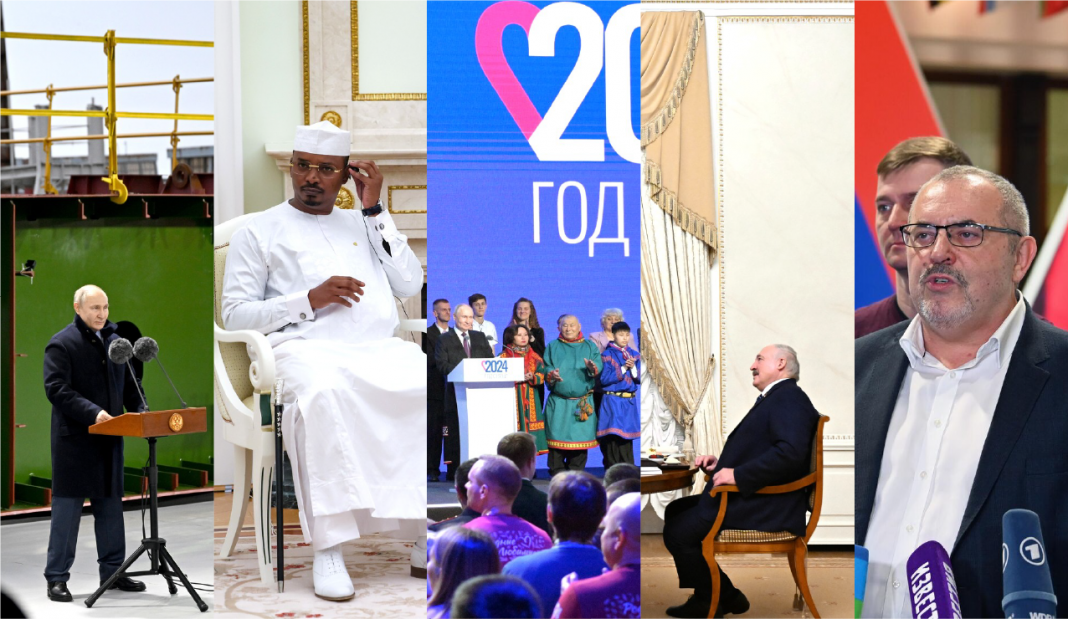This report describes the key events significantly influencing Russia’s political, economic, and social processes.
Assessing the past week’s results, we identify the following trends:
- With the opening of the Year of the Family, Putin would like to strengthen the signal that Russia and its leadership (unlike the West) is an outpost of traditional values. In Russia, the overwhelming majority of citizens have a negative attitude towards adherents of non-traditional relationships, believing that the spread of LGBT people is a socio-cultural, and not a biological, phenomenon. In such conditions, the concepts of “family” and “traditional values” are already markers that define the concepts of “us” and “stranger”, providing new motivation for supporting the Putin regime and for the fight against the West, which is tolerant of the “sin of Sodom.” The main thing is that Putin’s ally in this regard is the Church, which traditionally supports fighters against same-sex marriage.
- Developing relations with African countries (mainly Chad) is a priority for Russian diplomacy. Russia traditionally influences Chad: in particular, it supplies weapons there; Russian private military companies and advisers operate in Chad. Idris Deby’s visit concerns “contract extension” and “synchronising watches.” Russia is showing that it does not intend to leave the region, but on the contrary, it will increase its presence there (including through military and financial assistance to Chad). This meeting should be considered in the context of Russia’s other activities in Africa – in particular, last year’s Russia-Africa forum and Sergei Lavrov’s trips to the countries of the African continent.
- We can talk about a new strengthening of integration processes between Russia and Belarus, which in recent months have been slowed down due to new tension in relations between Minsk and Moscow. However, in mid-January, signals were received that the main contradictions had been resolved (economic, interpersonal, and so on). Belarus is now busy preparing for parliamentary elections, Russia for presidential elections. Putin needs a meeting with Lukashenko to show Russia’s new successes on the path of “gathering lands”; Lukashenko needs a meeting with Lukashenko to show his citizens that he is defending sovereignty. The three-day meeting should work towards both one and the other concept, even though they seem irreconcilable.
This report highlights the following most relevant for Russia matters, which occurred during 22-28 January:
1. Opening of the Year of the Family in Russia;
2. Negotiations with the Transitional President of the Republic of Chad, Mahamat Idriss Deby;
3. Vladimir Putin’s visit to Kaliningrad;
4. Vladimir Putin’s visit to St. Petersburg;
5. Visit of Alexander Lukashenko to St. Petersburg;
6. Nomination of Boris Nadezhdin for the presidential election.
This Content Is Only For Subscribers
- Opening of the Year of the Family in Russia
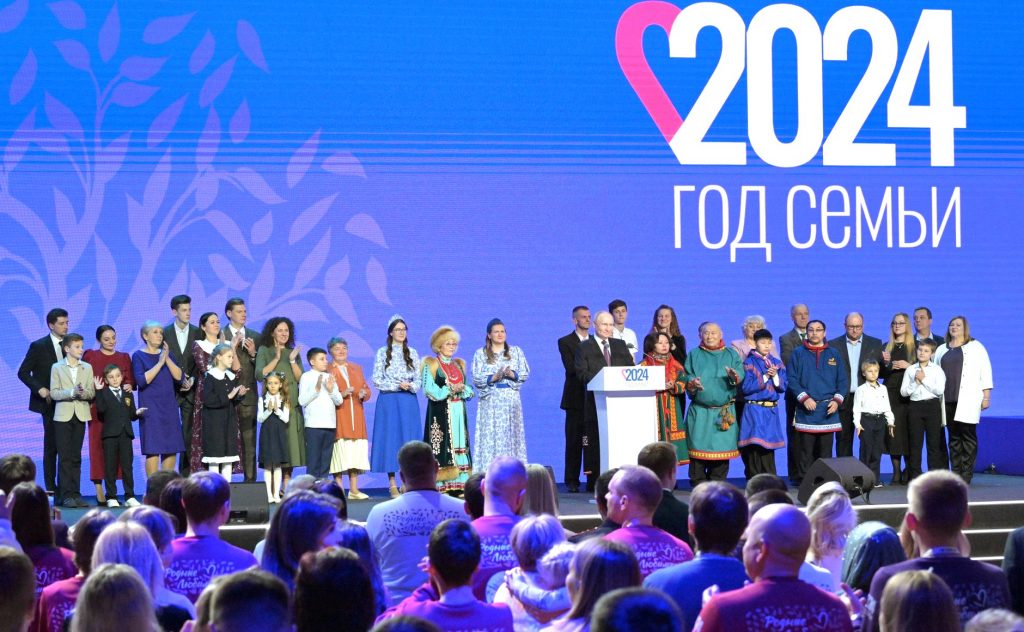
On Tuesday, January 23, Vladimir Putin participated in the All-Russian forum “Relatives and Loved Ones”. This forum was the first of several planned events dedicated to the Year of the Family in Russia. While participating in the discussion, the Russian President congratulated and officially started the Year of the Family in Russia, which replaced the Year of the Teacher and Mentor. Notably, Putin signed the corresponding decree on November 22, 2023.
Putin’s key theses:
- “The main purpose of the family is the birth of children, the continuation of the family, and therefore the continuation of our people, our centuries-old history. Our culture, identity, and national character are rooted in the family. The family teaches, educates, passes on traditions, knowledge, including professional experience.”
- “Your forum has a wonderful name – “Family and Loved Ones.” It briefly, succinctly and clearly expresses the meaning of family. And you – like most Russian families, you confirm this in practice with your life and destiny.”
- “We must have more and more large families, but I must say that there are more and more of them. In recent years, the number of large families has increased by approximately 26 per cent, and the number of children raised in large families has grown by exactly 30 per cent. This is a good indicator.”
- “It is important that the family is once again acquiring a high moral meaning in Russian society. Today, I would like to thank the spiritual shepherds of traditional religions in Russia, school teachers, and representatives of public organizations – everyone who contributes to preserving and strengthening our traditional family values. Among them are a strong, reliable connection between generations, respect for parents, care for elders, and the warmth of love from grandparents, which remains with us for life.”
- “Today in some countries, as you know, the institution of family, normal, simply normal human values are cynically destroyed and replaced by pseudo-values. Traditional family values are also being forgotten there. And we, on the contrary, will preserve, strengthen, and pass them on to future generations. This is the unconditional choice of our country.”
- “Family values are brought up from childhood and do not end at the threshold of the parental home; they are further embodied in deeds and actions. In the great devotion to their native country, in the courage of soldiers and officers – today participants in a special military operation, in working for the common good. This is both the selfless work of volunteers and the people’s support of our heroes, our fighters on the front line, coming from the heart.”
- “The most important thing is that the Year of the Family should be held with the wide participation of families. We can do a lot together to further our joint work and move forward. This means the future of our entire Motherland.”
Outcomes and outlook:
By opening of the Year of the Family, Putin would like to strengthen the signal that Russia and its leadership (unlike the West) is an outpost of traditional values. In Russia, the overwhelming majority of citizens have a negative attitude towards adherents of non-traditional relationships, believing that the spread of LGBT people is a sociocultural, and not a biological, phenomenon. In such conditions, the concepts of “family” and “traditional values” are already markers that define the concepts of “us” and “stranger”, providing new motivation for supporting the Putin regime and for the fight against the West, which is tolerant of the “sin of Sodom.” The main thing is that Putin’s ally in this regard is the Church, which traditionally supports fighters against same-sex marriage.
At the same time, this factor is unifying both within the country and at the regional level. First of all, we are talking about the Muslim world, where views on family and non-traditional relationships are formed on almost the same plane as in Russia. Thus, we can speak of an attempt to create a joint (polar) concept of differences between the West and the East at the sociocultural level and Russia’s attempt to lead in this direction.
- Negotiations with the Transitional President of the Republic of Chad, Mahamat Idriss Deby
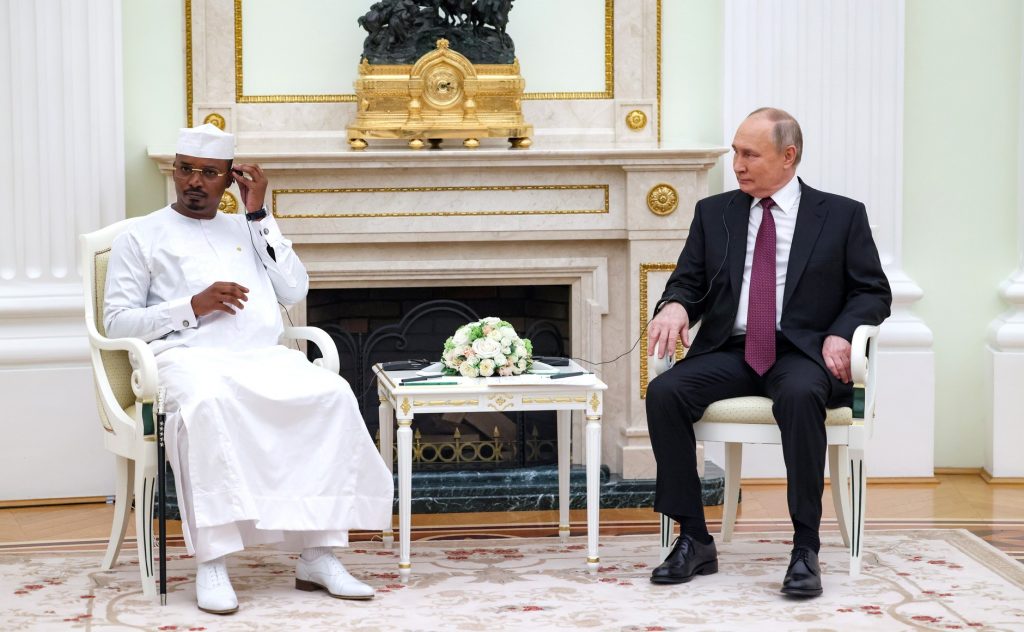
On Wednesday, January 24, Vladimir Putin held talks in the Kremlin with the transitional president of the Republic of Chad, Mahamat Idriss Deby, who arrived in Russia on an official visit. Despite difficulties with translation (during the public part of the meeting, the Chadian leader was not immediately able to understand how to put on the earpiece), the parties stated that they successfully discussed the prospects for the development of Russian-Chadian relations, as well as issues on the regional and international agenda.
Key theses:
- Putin: “This year, we celebrate the 60th anniversary of establishing diplomatic relations. Relations between our countries have been developing over the years, especially intensively in recent years. I would like to draw attention to the fact that contacts continue through the Ministry of Foreign Affairs and parliaments.”
- Putin: “Dear Mr. President, we are closely monitoring the situation that is developing in your country. And you know that we followed with great concern what was happening in terms of the fight against terrorist attacks and what happened to your father. We mourn. I would like to express my condolences once again.”
- Putin: “Nevertheless, we are glad you managed to hold a referendum on the Constitution. I am confident that the general elections will be held at a high level soon. We are glad that you have managed and are stabilising the country’s situation. We will support this in every possible way.”
- Debi: “This visit is historic. Chad and Russia have a very long and long-standing relationship. The last visit of the President of the State of Chad was in 1968 when Mr Francois was the President of Chad. We hope this visit will allow us to strengthen our bilateral relations and relations in all directions.”
- Debi: “I heard about the plane crash and would like, on my behalf and on behalf of the people, to express my sincere condolences for the death of Russian soldiers.”
- Debi: “I come from a friendly, brotherly country to you – a sovereign country that wants to strengthen relations with a friendly country.”
Outcomes and outlook:
Developing relations with African countries (particularly Chad) is a priority for Russian diplomacy. Mahamat Idriss Déby, nicknamed “Kaka” (which stands for “Grandmother” from the local dialect of Arabic, as his grandmother raised him as a child), became acting president and head of the Chadian Transitional Military Council in 2021 after the death of his father Idriss Déby Itno (he personally commanded the fighting against the rebels and died in battle). Idriss Deby is one of the youngest leaders on the African continent (he turned 40 on January 1). Russia traditionally influences Chad: in particular, it supplies weapons there; Russian private military companies and military advisers operate in Chad. Idris Deby’s visit concerns “contract extension” and “synchronising watches.” Russia is showing that it does not intend to leave the region, but on the contrary, it will increase its presence there (including through military and financial assistance to Chad). This meeting should be considered in the context of Russia’s other activities in Africa – in particular, last year’s Russia-Africa forum and Sergei Lavrov’s trips to the countries of the African continent.
- Vladimir Putin’s visit to Kaliningrad
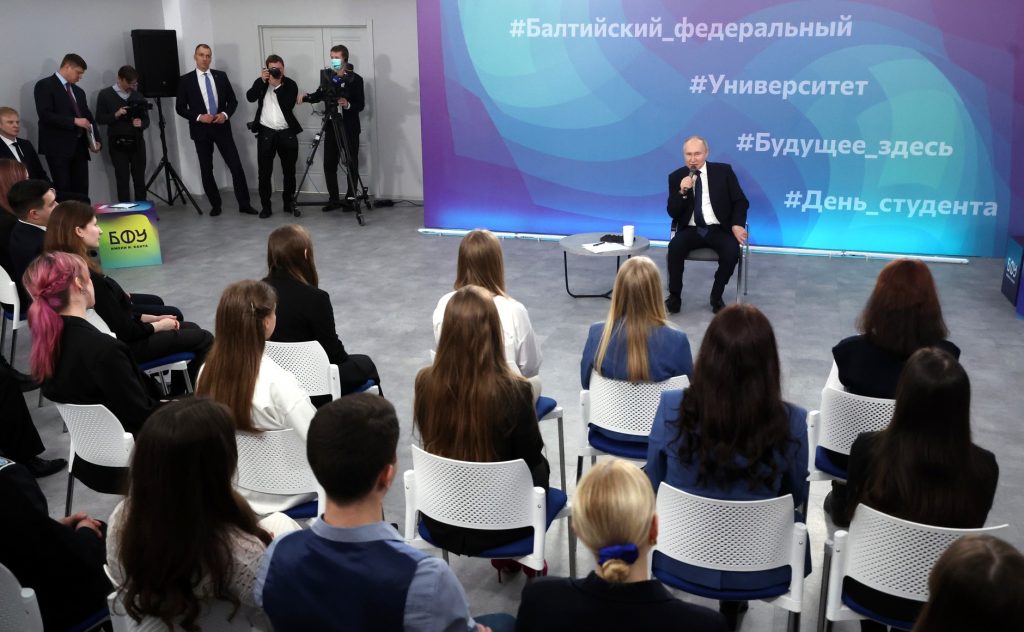
On Thursday, January 25, Vladimir Putin unexpectedly visited the Kaliningrad region. During the Russian visit, the President took part in a meeting with students of local universities, visited the construction of a cultural and educational complex, held a meeting on the socio-economic development of the region, met with the Governor of the Kaliningrad region, Anton Alikhanov, and also visited the local oncology centre.
Putin’s key theses after meeting local students:
- “Now, when our country is actively developing, the world is in such a stage of fundamental changes, I mean not only the political sphere, world order, multipolarity and so on, I mean technological changes, technological revolution, everything that is happening in the world around us, everything is developing quickly, intensively and interestingly.”
- “By the way, when I received higher education in the Soviet Union, this was the desire to get a higher education – now I can’t give these percentages; I don’t know how to relate this to the current situation in the Russian Federation – but then the desire to get a higher education was very high. I come from a working-class family: my mother and father are working people, but they tried at all costs to create conditions for me to receive a higher education. That was the general attitude in the community.”
- “If two people produce only one, then the population decreases. Even if there are two, it remains on the horizontal bar. To ensure population growth, the minimum requirement is for a family to have three children. And for this to happen, the family must be born early.”
- “We have very, very good relations with India. They did not arise today – they appeared many, many decades ago. Everyone knows well, and in India, I know they remember this: the Soviet Union was the country that supported India’s struggle for independence and supported the formation of Indian statehood, economy, industry, and social sphere in the first steps.”
- “Suffice it to say that the largest foreign investment – at least so far this has been the case – in the Indian economy came from Russia: our company Rosneft invested $23 billion in the acquisition of an oil refinery, a network of gas stations, a port, and so on Further. They also have a plan for the future: they want to build a factory and so on. Well, that’s just one example.”
- “In general, India is developing at an amazing pace. India’s GDP growth is 7.7 per cent, one of the highest rates of economic development and economic growth in the world. And this was also done thanks to the leadership qualities of the current Prime Minister: it was during his leadership that India reached such a pace.”
- “Russia is one of the largest fish-producing countries in the world. We are doing more and more to build fishing vessels of various classes. Now, I won’t bother you with what and how it is.”
- “By the way, unlike some of our neighbours, we do not destroy anything; we treat everything with care. And the fact that there are elements of German culture here, we carefully and carefully study everything and try to preserve.”
Key states from the meeting on the socioeconomic development of the Kaliningrad region:
- Putin: “Soon, in the first quarter of this year, the second plant for creating solar cells will be launched at the Kaliningrad site. As a result, Europe’s largest production of equipment for solar power plants will operate here in the Kaliningrad region. This is a significant event not only for residents of the region but also for the entire country. The launch of these advanced enterprises allows us to localise in our country the production of the main components necessary for the development of solar environmentally friendly generation and to create solar power plants on our industrial base.”
- Putin: “I know that the project’s initiators worked proactively and began training personnel for their tasks in advance together with the Baltic Federal University. This is a good example of a partnership between the education system and business, the real sector of the economy. By the way, we just talked about this; one way or another, we touched on these topics at a meeting with students of Kaliningrad universities.”
- Alikhanov: “The opening of the Enkor plant to produce silicon wafers is a significant event for us. This region’s largest production facility was created over the past ten years. In addition, this is a new step towards a new industrial specialisation of our region – the production of products for solar energy.”
- Alikhanov: “The effects are clear to us: new tax revenues, but the most important thing is new jobs. Here, I want to emphasise that the enterprise was created not in Kaliningrad, not near Kaliningrad, but in the east of the region, in Chernyakhovsk. For us, it is essential. Now, this newly opened enterprise employs more than 300 highly qualified specialists, and their number will more than double with the opening of the second site in March of this year. Thus, Anchor becomes one of the largest employers in the east of our region.”
- Manturov: “In general, the volume of import-substituting products that the entire complex will produce allows us to say that it will become the largest in Europe and the Eurasian space. Thanks to this, we can implement plans to develop solar generation in our country using our equipment. We will also supply it to our partners abroad.”
- Putin: “What would you like to say first? The Kaliningrad region is, of course, the westernmost region of Russia and, in this regard, has a special geography. Because of this, illegal actions of some countries, violations of supply chains, and attempts at a transport blockade complicate enterprises’ work.”
- Putin: “This was reflected in key indicators. If in Russia as a whole, the growth of industrial production amounted to an impressive figure of 14.6 per cent, then in Kaliningrad, industrial production decreased by 7.7 per cent over the eleven months of 2023. Therefore, considering these challenges and emerging new realities, we must further support the region’s development.”
- Reshetnikov: “Based on last year’s results in the Kaliningrad region – even though some decline is expected, as Anton Andreevich [Alikhanov] said – they seem to have caught up a lot in recent months. Nevertheless, production increased in several industrial sectors: electronics, chemicals, and food. Agricultural production, construction, and investments increased by 45 per cent in three quarters above the Russian average.”
- Reshetnikov: “According to Russian Railways, deliveries to the region by rail not only recovered but also exceeded the pre-sanction period by almost 40 per cent. And the decrease in traffic from the region, caused precisely by the bans and restrictions of the Baltic countries, was compensated by a reorientation to sea transport.”
- Reshetnikov: “Implementing all projects in the economy and launching new ones will require personnel: in the industry alone, by 2030, more than 14 thousand new jobs will be created in the region. This is a big challenge for the region; the demand for personnel here is more than five times higher than the supply.”
- Khusnullin: “Our Kaliningrad region is consistently a leader in housing construction. In the last four years, they have built more than a meter per person. It is among the top ten region leaders, and the national project “Housing” has already been completed and exceeded. I reported to you about this, our Kaliningrad region is one of such regions.”
- Khusnullin: “At the end of 2022, a program for developing the supporting road network was signed between Rosavtodor and the Kaliningrad region. The supporting road network – the main routes along which people and cargo travel – includes 700 kilometres, of which 250 kilometres are federal roads; today, they are already completely (85 per cent) in standard condition.”
Key theses from the meeting with the Kaliningrad region’s governor:
- Alikhanov: “Your decree has designated this year as the Year of the Family. In the Kaliningrad region we now have 260 thousand families, 180 thousand of them are families with children. I want – and we are working on this – for their number to grow so that there are as many of them as possible. We are implementing a special program to increase the birth rate – last year, about 420 million [rubles] were allocated for this purpose. We continue all support measures, including monthly cash payments and one-time benefits. And, by the way, starting this year we will reimburse 50 percent of college fees. If children from large families enrol in a paid school, we compensate them.”
- Alikhanov: “One more thing, Vladimir Vladimirovich, our population is growing, and the child population is also growing. I told you today: five and a half thousand plus from 2021 to 2023, that is, in two years, in two September, we [received] plus five and a half thousand people. I know that our school construction program is ending this year; we actively participated in it: four have already been built, eight are currently under construction, and we will complete it this year.”
Outcomes and outlook:
For Vladimir Putin, a visit to Kaliningrad is a “trip to the front line” since the Kaliningrad region not only borders NATO states but is also separated from the rest of Russia by a line of unfriendly states. In the minds of Russians, Russia is at war with NATO and is in a mode of tough confrontation with NATO. Therefore, this visit is given no less attention than, for example, Putin’s trips to Crimea, Mariupol or Rostov-on-Don. Governor of the Kaliningrad region Anton Alikhanov is a man of the head of Rostec Sergei Chemezov, a close friend of the head of the Russian Presidential Administration Anton Vaino. Alikhanov’s career growth and his possibility of moving to higher positions have been repeatedly predicted in Russia. He has held his current position since October 2016, taking office at 30.
Moreover, along with Putin, a whole troop of high-ranking Russian officials arrived in Kaliningrad: Deputy Prime Minister Alexander Novak, Deputy Prime Minister Marat Khusnullin, Deputy Prime Minister Dmitry Chernyshenko, Presidential Aide Maxim Oreshkin, Minister of Economic Development Maxim Reshetnikov, Minister of Transport Vitaly Savelyev and others. The delegation’s trip in this composition became indicative of the West. The main emphasis: “we are not afraid of NATO and do not experience any threat.”
- Vladimir Putin’s visit to St. Petersburg
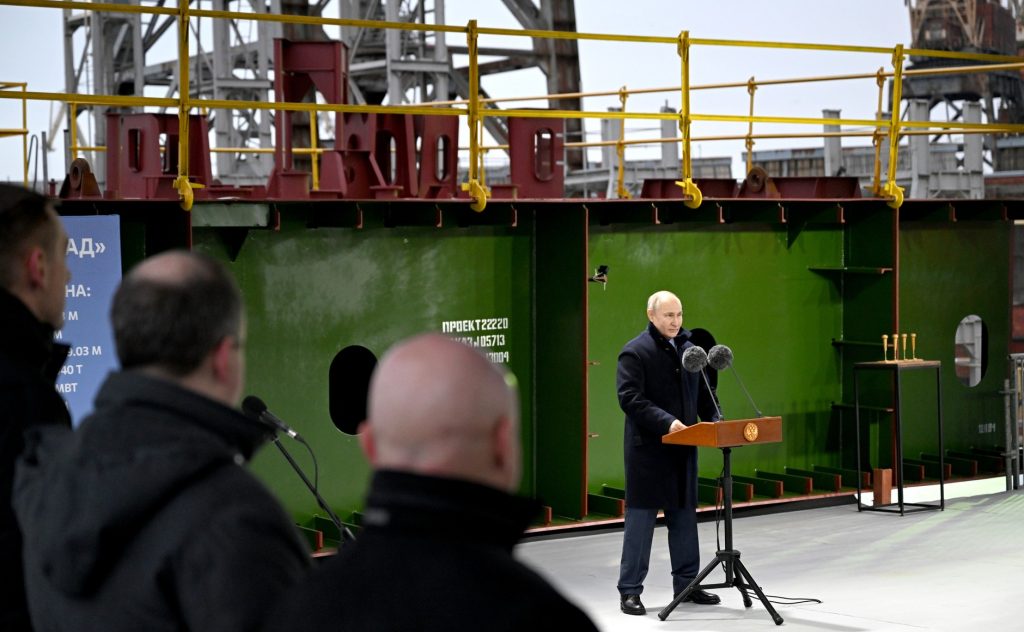
On Friday, January 26, Vladimir Putin began his visit to St. Petersburg, which lasted the entire weekend and should end only on Monday evening. During this time, the Russian president took part in several public events and meetings and held several meetings at different levels. In particular, Putin took part in the laying ceremony of the nuclear icebreaker “Leningrad”, held a meeting with students – participants of the so-called “SMO”, held a meeting on the socio-economic development of the St. Petersburg agglomeration, opened a memorial to civilians of the USSR – victims of the Nazi genocide in years of the Great Patriotic War, and also took part in events dedicated to the 80th anniversary of the lifting of the siege of Leningrad.
It is worth noting that on Monday, January 29, a meeting of the Supreme State Council of the Union State will occur in St. Petersburg. At the same time, Vladimir Putin and Alexander Lukashenko met on Sunday, January 28. We analyse it below.
Putin’s key statements from the nuclear icebreaker Leningrad laying ceremony:
- “Today we have a big, pleasant and significant event: here in St. Petersburg, at the Baltic Shipyard, a new nuclear icebreaker is being laid down. It will bear the name Leningrad.”
- “Tomorrow we celebrate a special, sacred date in the history of the Northern capital and the whole country – the 80th anniversary of the complete liberation of Leningrad from the enemy, Nazi blockade. And the new mighty icebreaker will be another tribute to the memory of the immortal feat of Leningrad, the courage and unbending will of the defenders, the inhabitants of the city, who did not submit, overcame everything, withstood everything and crushed the Nazis. The life, unity, and cohesion of the generation of winners will always be a great moral example for us. In the struggle for sovereignty, freedom, and our Motherland, they will be a good example both in work and battle.”
- “Russia today has a unique, I want to emphasise this – unique – the largest icebreaker fleet in the world. This is our huge competitive advantage, enormous opportunities for the development of logistics, industry, the creation of new jobs, the integrated development of Arctic cities and towns, the implementation of truly global-level projects, for international cooperation with our partners, friends, with everyone who wants and is ready work with Russia.”
Key theses from the meeting with students who participated in the so-called “SMO”:
- “I think that all of you, having returned from the combat zone, have probably already realised all this yourself; you will return as completely different people. It’s one thing to look on the Internet and watch someone’s speeches and another thing to find yourself in the trenches, where shells are falling, where bullets are whistling, where there are mines, where drones are flying like flies, where it’s cold and dangerous. This is a completely different story. This cannot but influence a person, his worldview.”
- “Let me remind you that we tried in every possible way to build relations with Ukraine for decades, whatever we did: preferential loans, energy resources at bargain prices, and our market provided – well, everything – no, still always the de-facto owner of Ukraine after the collapse of the Soviet Union, the actual masters were the nationalists and those who represent them. No matter who is elected with the help of the south-east of Ukraine, with the help of voters who live in the south-east, still this nationalist platform, its representatives very quickly subjugated everyone to their will because they are active, energetic and aggressive, and all at once they looked into the eyes.”
- “In addition, after the “coup,” as we know, events began in the Donbas, the extermination of people in the Donbas. This continued for eight years, almost nine, and then they simply refused to implement the Minsk agreements; they simply publicly stated: we won’t; there is nothing for us in these agreements I do not like. But the fighting there continued, and I know that some have been following this situation since the first months or have even been in this zone; those present here will certainly confirm this. And everything that happened there, especially in the territories occupied by the enemy, was genocide; there is no other way to call it. Extermination of people is simple. Russians were declared a non-titular nation there; a law was adopted in our historical territories. I don’t want to use profanity… That is, I want, on the contrary, to use it. But it is impossible since the cameras are working here and the girls are present. But I want to use it.”
- “Firstly, we declare anyone as a terrorist structure – these decisions are made not by administrative bodies at any level but by the courts. According to Russian law, only a court can designate an organisation as a terrorist. This is what happens here. Indeed, organisations such as Right Sector, Aidar, I don’t know, Azov, and some other organisations that operate on the territory of today’s Ukraine are recognised as terrorists. They are like this both in their ideology and in the practice of what they do; this is so.”
- “As for government agencies, this should not be a court decision. You know, politics is historical. After all, the entire current Kyiv regime is, in one way or another, based on the crimes that it commits every day, including against its citizens. But these are historical assessments, political ones.”
- “Look: they shot down our Il-76 plane with its servicemen, 65 people. We didn’t just bring them there. The Main Intelligence Directorate and the Ukrainian Armed Forces knew we were taking 65 military personnel there. And, in my opinion, 190 were planned in total. And, knowing this, they struck this plane.”
- “I don’t know whether they did it on purpose or by mistake, through thoughtlessness, but it’s obvious that they did it. Firstly, two missile launches were recorded from territories controlled by the Kyiv regime at 11:10 am. The aircraft was hit within 2–3 minutes. It was almost impossible to react.”
Key theses from the meeting on the socioeconomic development of the St. Petersburg agglomeration:
- Putin: “St. Petersburg – I won’t say anything new here – is the country’s most important historical, cultural, and business centre. Approximately 7.6 million people live in the Northern capital and the Leningrad region. Our key logistics hubs and seaports are located here; the largest scientific, technological and educational centres, production and industrial sites are successfully operating – both recently opened and legendary enterprises with a long history and strong traditions.”
- “The basis of the industry of St. Petersburg is the processing industries, this is approximately 10.5, even 10.6 per cent: shipbuilding, machine-building complex, including heavy power engineering, defence industry enterprises. The growth of industrial production in St. Petersburg in 2021 amounted to 6.4 per cent in 2022 – slightly lower, 6.1 per cent; in January-November last year, it increased to 9.6 per cent. The leading industries of the Leningrad region are petroleum products, food and chemical industries.”
- Minister of Economic Development Maxim Reshetnikov: “Trade flows have reorientated in the last two years. Exports to European countries and the United States through the ports of the agglomeration have decreased. Over two years, the share of these countries fell from 77 to 13 per cent. Eastern ones and supplies have almost completely replaced Western markets with other friendly countries: India, China, the United Arab Emirates, Brazil, Egypt, and Turkey. Imports from Germany, Finland, and South Korea also gave way to supplies from India, China and Turkey.”
- Reshetnikov: “Our neighbours have redirected their cargo from the Baltic ports to our North-West. Transit volumes from Belarus and Kazakhstan have almost doubled. As a result, by the end of 2023, the transhipment volume through seaports is expected to be almost the same level as in 2021. At the same time, there is a redistribution within the agglomeration: the decrease in the volumes of the “Big Port of St. Petersburg” is offset by the increase through Ust-Luga and Primorsk.”
- Reshetnikov: “At the same time, it should be noted when making decisions that our promising export directions have shifted from West to East and the transport route for goods from Siberia and the Urals through the North-West is more expensive than through the Eastern range. Export traffic volumes are becoming very sensitive to world prices and transport costs. And if the market conditions change or tariffs increase, they may become unprofitable.”
Key theses from the opening ceremony of the memorial to civilians of the USSR – victims of the Nazi genocide during the Great Patriotic War (an in the official ceremony, which Vladimir Putin, together with Alexander Lukashenko, joined on Saturday, January 27):
- Putin: “January 27 is one of the most important dates in our common, national history. On this day in 1944, Red Army troops completely broke the blockade of Leningrad, and a year later, in 1945, they liberated Auschwitz.”
- Putin: “For eight decades now, our pain has not subsided for these terrible victims, for the crippled destinies, for everyone who went through incredible trials. Our compassion is passed on from generation to generation. It has no statute of limitations, just as the crimes of Hitler’s fanatics and their accomplices, those who cold-bloodedly planned and cruelly committed the genocide of the Soviet people, do not.”
- Putin: “Of the total number of losses that the Soviet Union suffered during the Great Patriotic War, more than half were civilians. And this is convincing proof that the Nazis and their satellites did not fight against a political regime or ideology – no. Their goal was the richest natural resources, the territories of our country and the physical destruction of the majority of citizens. They prepared for the rest the role of slaves, deprived of their native culture, traditions and language.”
- Putin: “Death was put on stream in concentration camps, ghettos, prisons in Germany, in the occupied lands of Austria, Holland, Czechoslovakia, Poland, and the Soviet Union. There was a death camp here, in Gatchina, and not far away, there was a camp where children, very small children, were kept, from whom the Nazis pumped out blood for their soldiers.”
- Putin: “This is important for us today and for the future. We see how these days, the results of the Nuremberg trials, during which Nazism was given an unambiguous legal assessment, are being revised. In some countries, not only are history being rewritten and the executioners are being justified: revanchists and neo-Nazis have adopted the ideology and methods of the Nazis.”
- Putin: “We will do everything – everything to stop and completely eradicate Nazism. The followers of the Nazi executioners, no matter what they call themselves today, are doomed. And nothing can stop the desire of millions of people not only in our country but throughout the entire planet for true freedom, justice, peace and security.”
- Lukashenko: “Today, on the Day of the complete lifting of the siege of Leningrad, we are immersed in the thoughts and feelings of people who experienced hell on Earth. Even after 80 years, the memory of these events makes hearts clench, once again experience the bitterness of loss and the joy of liberation, and the incredible intensity of the struggle for life, for our Victory.”
- Lukashenko: “The price of the Great Victory is our common pain, common to all peoples sentenced to death by Nazi Germany. Belarusians feel it like no one else. This pain is cast in bronze and engraved in stone on thousands of mass graves of unknown soldiers, in places of mass executions of civilians and selfless feats of Red Army soldiers, partisans, underground fighters from Moscow to Brest and Berlin.”
- Lukashenko: “How can you think that destroying a monument will destroy the memory that lives in the people’s hearts? A people who have found the strength to build new peaceful relations with those states that just yesterday brought suffering and death to our lands.”
- Lukashenko: “You know, dear friends, let’s be honest. We – in vast Russia and Belarus – have thousands, thousands of monuments, and the vast majority of these monuments are to the deserved ones, to those Red Army heroes, partisans, people who defended their land with weapons. And somehow, perhaps not entirely intentionally, we did not forget but did not pay that tribute to our rear soldiers, those who accomplished the feat in the rear. We talked a lot about this, but most of the monuments are to those who defended their Motherland with weapons and could defend themselves.”
- Lukashenko: “We cannot change the past, but we have the power to protect the future. Let this memorial protect our common historical memory, the brotherhood of peoples and the strength of the indestructible unity of nations that united in the fight against world evil and defeated it. This is very important for us today.”
Outcomes and outlook:
Putin always assigns an essential place to St. Petersburg – as his hometown and as the “second capital” of the Russian Federation. Since members of his family (elder brothers) died during the Siege of Leningrad, the topic of visits to St. Petersburg during the days of the end of the Siege is very important for Putin, even on a personal level. Moreover, 2024 marks the 80th anniversary of breaking the Siege of Leningrad. In addition to the usual meetings with economic activists of the city and region for regional trips, Putin decided to saturate the trip with meaning as much as possible.
Firstly, he gave a message that Russia, like in 1944, has now broken through the blockade – the economic one. A reference to financial growth figures was supposed to show that they tried to strangle Russia in the grip of sanctions, but it broke through. Secondly, the construction of the Leningrad icebreaker should show intentions regarding the development of the Northern Sea Route and dominance in the Arctic, which is a severe challenge to the United States and its satellites (in addition to the Arctic, Russia has made a serious bid to strengthen its presence in the Antarctic). Thirdly, the appeal to the historical heritage and the rehabilitation of geographical names and historical figures of the USSR era is also an essential message to Russian citizens. And fourthly, Putin specially invited President Alexander Lukashenko to St. Petersburg to demonstrate both the unity of positions and the accelerated pace of creating a single “union state,” which has slowed down recently.
- Visit of Alexander Lukashenko to St. Petersburg
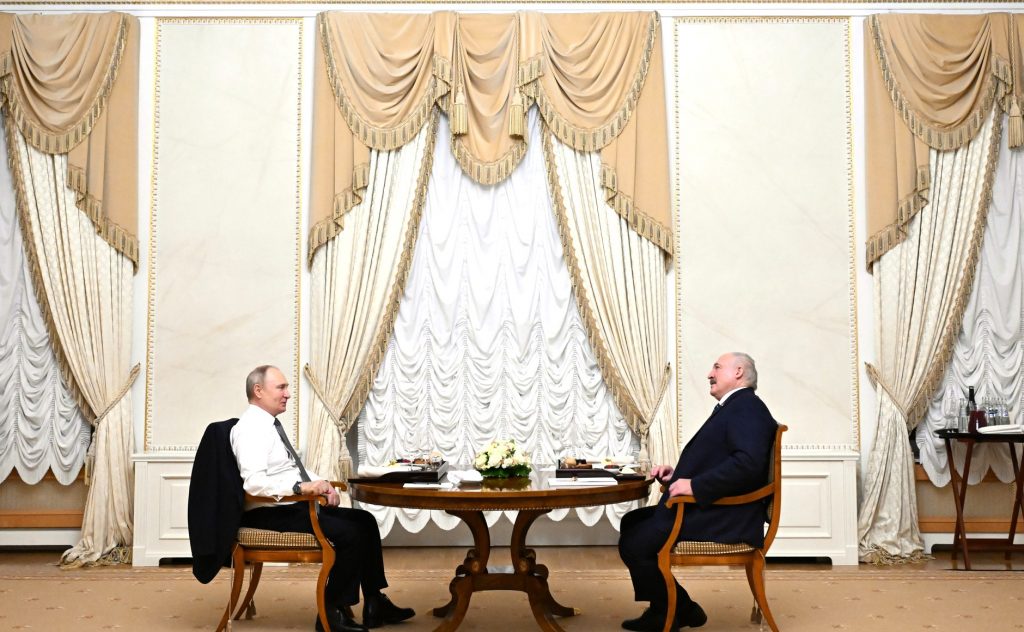
On Saturday, January 27, President of Belarus Alexander Lukashenko arrived on an official visit to St. Petersburg. The official reason for the visit was to participate in the Supreme State Council of the Union State meeting. However, since the meeting itself will take place only on January 29, within two days, Lukashenko had time to participate in several events dedicated to the eightieth anniversary of the lifting of the siege of Leningrad, as well as a meeting with Vladimir Putin, which took place on Sunday, January 28.
Key theses:
- Putin: “Thank you for accepting the invitation. And I am very pleased that you agreed to change even slightly the schedule of our joint work. I mean our joint work tomorrow within the Supreme State Council of the Union State in connection with the fact that the city of Leningrad, St. Petersburg, celebrates the 80th anniversary of the complete lifting of the Nazi blockade. We attended this event, and yesterday, we were in Gatchina for the opening of a new memorial dedicated to the victims among the civilian population of the Soviet Union during the Second World War.”
- Putin: “Generally, the situation here is developing very energetically. In the first ten months of last year, our trade turnover [was], according to our data, $42.5 billion; if we speak in dollar terms, it is constantly growing. Russia is the largest investor: our investors invested $4 billion in the economy of Belarus. And this work is going on bilaterally: our enterprises, our business operates in Belarus, and our Belarusian friends are increasingly exploring the Russian market, working here more and more actively.”
- Putin: “Today, it would seem, we considered such an unusual issue as cooperation in Antarctica. It would seem, where are we, and where is Antarctica? No, it turns out there are common interests there, too. There is something to work on together, and we will certainly do it.”
- Lukashenko: “We held a significant event for our people – Russians, Belarusians. I already said at the opening of the monument that you very subtly grasped the situation that we owe something to the rear, our people who could not defend themselves in the rear and whom the Nazis, breaking through, killed, pumped blood out of children, etc. This is monumental, and at the same time speaking monument; it is very decent and respectable.”
- Lukashenko: “As for Antarctica: that’s right, in the Soviet Union, no one divided anything; they worked together. And I am very happy, as are you, I guess, too. We are glad we have not separated; we are doing something common in Antarctica. And I thought: what country could provide such opportunities to a country like Belarus? After all, in Russia, by and large, we don’t see any problems. If Russia has it, and Russia has a lot of things, please come, work, let’s work together, take it, earn money, act. No country would be able to treat the way you treat Belarus. Again, I’m projecting, but what prevented Ukraine and the Baltic countries from working with us like that? This is our world; we have been building it for several decades; we won this terrible war together – let’s move in this direction. No, I don’t want to; they seek a better life beyond the seas. These events generate such sentiments.”
Outcomes and outlook:
We can talk about a new strengthening of integration processes between Russia and Belarus, which in recent months have been slowed down due to new tension in relations between Minsk and Moscow. However, in mid-January, signals were received that the main contradictions had been resolved (economic, interpersonal, and so on). Belarus is now busy preparing for parliamentary elections, Russia for presidential elections. Putin needs a meeting with Lukashenko to show Russia’s new successes on the path of “gathering lands”; Lukashenko needs a meeting with Lukashenko to show his citizens that he is defending sovereignty. The three-day meeting should work towards both one and the other concept, even though they seem irreconcilable.
- Nomination of Boris Nadezhdin for the presidential election
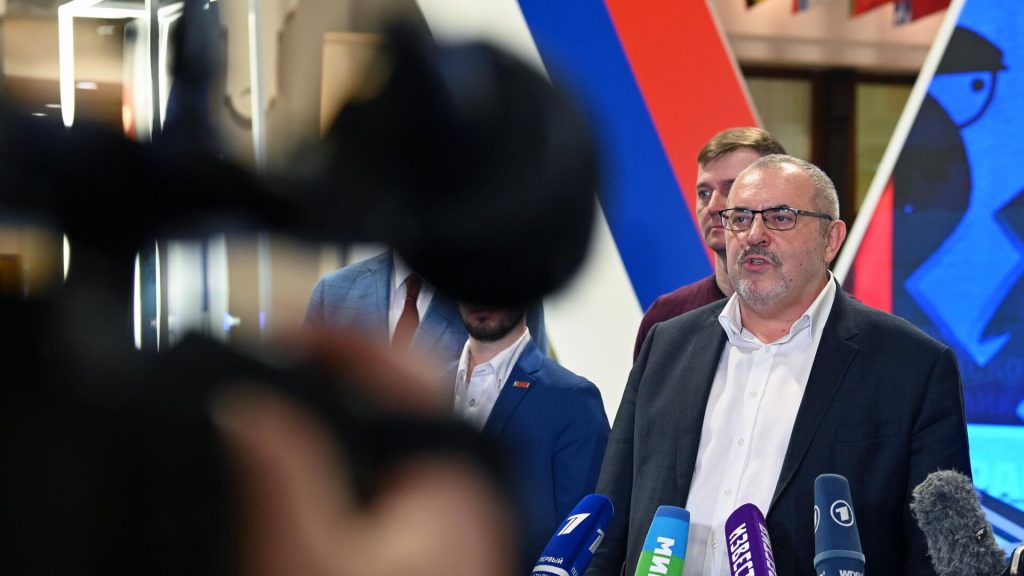
On Monday, January 22, the topic of nominating an opposition candidate for the presidential elections, scheduled for March 17, intensified in Russia. The Russian liberal opposition supported the nomination of public figure Boris Nadezhdin to the post of President of the Russian Federation, who, among other things, opposes the war in Ukraine. Journalist Ekaterina Duntsova, previously denied registration by the Central Election Commission, declared his support. He was also supported by the famous liberal blogger Maxim Katz, who called Nadezhdin “the only anti-war candidate.” After Katz, the disgraced oligarch Khodorkovsky and Navalny’s supporters, Georgy Alburov, Lyubov Sobol and Ivan Zhdanov, spoke out in favour of this candidate.
By evening, videos began circulating online showing large queues of people wanting to leave their signatures to register Nadezhdin as a candidate. Such queues were recorded in several cities and regions of the country.
In essence, the phenomenon of Boris Nadezhdin is that he became the only opposition politician (a former adviser to Boris Nemtsov and his colleague in the Union of Right Forces party) who opposes the war in Ukraine who was allowed to collect signatures to participate in the presidential elections of the Russian Federation.
Outcomes and outlook:
The nomination of Boris Nadezhdin is a technological move to create the illusion of participation in the campaign of an “opposition candidate.” Staged “queues for signatures” and support from opposition leaders are clearly controlled and managed by the authorities. The authorities will then say that Nadezhdin’s result (predictably minimal) is an actual result of support in society. The opposition, appealing to pictures with queues, will say that Nadezhdin’s victory was stolen (according to the Belarusian scenario of 2020, when the opposition announced Tikhanovskaya’s victory and that Lukashenko’s honest rating was 3%).

